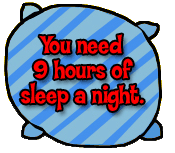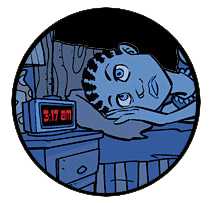QUESTIONS ANSWERED
 The night before a big test, should I stay up as late as possible so I can study more?
The night before a big test, should I stay up as late as possible so I can study more?
If you feel sluggish, drinking a soda with caffeine or lots of sugar can help you catch up and feel more energetic, right?
How do I know how much sleep I need?
I have such a hard time getting up in the morning—this never used to happen. What’s going on?
Sometimes I toss and turn for a long time before I fall asleep. What should I do to fall asleep faster?
![]() The night before a big test, should I stay up as late as possible so I can study more?
The night before a big test, should I stay up as late as possible so I can study more?
![]() If you’ve got a ton to learn, it’s best to study a little bit every day, rather than cramming the night before the test. You’re better off getting a good night’s sleep before a test than spending all night studying. That’s because sleep has a big role in memory. Sleep helps everything you’ve studied “set” in your mind, so you can remember it later. It’s like pressing “save” after working on a computer. Getting enough sleep also helps you pay attention and concentrate the next day. Make sure you leave yourself enough time the night before the test so you can review what you need to, and still get to bed at your normal time.
If you’ve got a ton to learn, it’s best to study a little bit every day, rather than cramming the night before the test. You’re better off getting a good night’s sleep before a test than spending all night studying. That’s because sleep has a big role in memory. Sleep helps everything you’ve studied “set” in your mind, so you can remember it later. It’s like pressing “save” after working on a computer. Getting enough sleep also helps you pay attention and concentrate the next day. Make sure you leave yourself enough time the night before the test so you can review what you need to, and still get to bed at your normal time.
![]() If you feel sluggish, drinking a soda with caffeine or lots of sugar can help you catch up and feel more energetic, right?
If you feel sluggish, drinking a soda with caffeine or lots of sugar can help you catch up and feel more energetic, right?
![]()
 While caffeine and sugar might pick you up short term, they’ll leave you even more drained than before. Drinking caffeine can affect your sleep, even hours later. It can create a vicious cycle: you feel drained, so you down a soda, but then that night you can’t sleep well, so you feel drained the next day, so you have another soda, and on and on. The ups and downs can make you feel like you’re on a roller coaster; and the longer you stay on, the lower the lows are, and the more caffeine or sugar it takes to get you back up. Also, caffeine and sugar don’t have any of the other good effects of sleep, like improving memory and concentration, or helping your body regulate growth and tons of other stuff. (Learn more on how nutrition affects energy). It’s much better to get enough sleep. Set a regular schedule for waking up and going to bed. Calm down in the last hour before bedtime, and make your bedroom quiet, cool, and dark.
While caffeine and sugar might pick you up short term, they’ll leave you even more drained than before. Drinking caffeine can affect your sleep, even hours later. It can create a vicious cycle: you feel drained, so you down a soda, but then that night you can’t sleep well, so you feel drained the next day, so you have another soda, and on and on. The ups and downs can make you feel like you’re on a roller coaster; and the longer you stay on, the lower the lows are, and the more caffeine or sugar it takes to get you back up. Also, caffeine and sugar don’t have any of the other good effects of sleep, like improving memory and concentration, or helping your body regulate growth and tons of other stuff. (Learn more on how nutrition affects energy). It’s much better to get enough sleep. Set a regular schedule for waking up and going to bed. Calm down in the last hour before bedtime, and make your bedroom quiet, cool, and dark.
![]() How do I know how much sleep I need?
How do I know how much sleep I need?
![]()
 Kids who are 7 to 11 years old need at least 9 hours of sleep a night. But everyone’s different—the surefire way to tell if you’ve gotten enough sleep is if you wake up feeling refreshed. You don’t need to bounce out of bed, but if you wake up dragging and willing to sell your kid sister for an extra half-hour, you should hit the sheets earlier tonight. If you wake up without your alarm clock, that’s a sign you’ve slept enough.
Kids who are 7 to 11 years old need at least 9 hours of sleep a night. But everyone’s different—the surefire way to tell if you’ve gotten enough sleep is if you wake up feeling refreshed. You don’t need to bounce out of bed, but if you wake up dragging and willing to sell your kid sister for an extra half-hour, you should hit the sheets earlier tonight. If you wake up without your alarm clock, that’s a sign you’ve slept enough.
![]() I have such a hard time getting up in the morning—this never used to happen. What’s going on?
I have such a hard time getting up in the morning—this never used to happen. What’s going on?
![]()
 Everyone has an internal clock that controls when you get sleepy and when you’re wide awake. There’s a big shift in your internal clock when you go through puberty—it gets later, which means as you get older, you might not be able to fall asleep until 11 p.m., and you might want to sleep through the morning.
Everyone has an internal clock that controls when you get sleepy and when you’re wide awake. There’s a big shift in your internal clock when you go through puberty—it gets later, which means as you get older, you might not be able to fall asleep until 11 p.m., and you might want to sleep through the morning.
You might want to go to bed late and sleep in on the weekends, but keeping this schedule means it can be tough to get up on Monday morning.
The best way to cope with this is to keep a consistent schedule—go to bed and wake up at the same time every day, weekend or weekday.
![]() Sometimes I toss and turn for a long time before I fall asleep. What should I do to fall asleep faster?
Sometimes I toss and turn for a long time before I fall asleep. What should I do to fall asleep faster?
![]()
Have no fear! There are things you can do to calm down before bedtime.
- Relax for an hour at least before bedtime. This isn’t the time for push-ups or that hilarious movie that makes you laugh ‘til your side hurts.
- Your body temperature drops at night, which is one signal to your body to get sleep. Taking a warm bath before bedtime is one trick to fool your body—when your temperature drops after the bath, it will signal bedtime.
- Don’t eat a heavy meal within a few hours of bedtime. All the blood will go to your stomach to digest it and keep you up.
- You can have a light snack before bed. Try a cup of warm milk—it’s known for bringing on the zzz’s. There’s a nap-friendly substance in milk called tryptophan (it’s also in turkey, which may be why you want to take a nap after Thanksgiving dinner). Also, like having a warm bath, drinking warm milk will raise your temperature a little bit, and then it will drop back to normal. The drop in temperature can trigger sleep because it reminds your body of falling asleep (when your body temperature drops naturally).
- Try not to have any caffeine, and if you do, don’t have any after lunch. Same goes for sugary drinks or treats. Sugar and caffeine give you a burst of energy that’ll make you too wired to snooze.
- If your worries are keeping you up, write them down. Putting them down on paper helps keep them from rattling around in your head.
- Try and make your room as much like a cave as possible—quiet, cool, dark, and peaceful. Turn off the radio, TV, or anything noisy, and draw the shades.
Staying in bed when you can’t fall asleep can be stressful. If you’re tossing and turning, get out of bed and do something calm, like reading in dim light, until you feel tired again. Then go back to bed.
Over the long run, you can improve your sleep by:
- Trying to go to bed and wake up at the same time every day.
- Being active at least a few hours before bedtime. That’ll use up energy during the day, and give you enough time to calm down before hitting the sack.
- Training your brain so that when it sees your bed, it thinks, “sleep.” Do homework and chat on the phone somewhere else.
- Page last reviewed: May 9, 2015
- Page last updated: May 9, 2015
- Content source:



 ShareCompartir
ShareCompartir